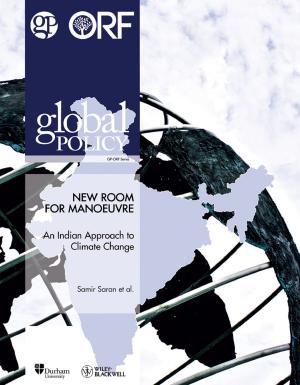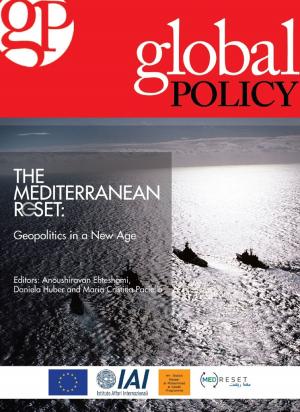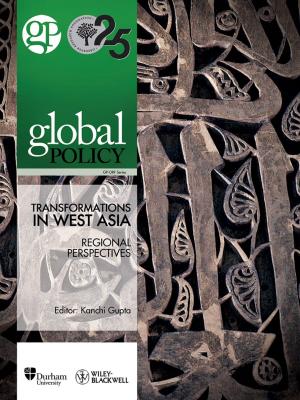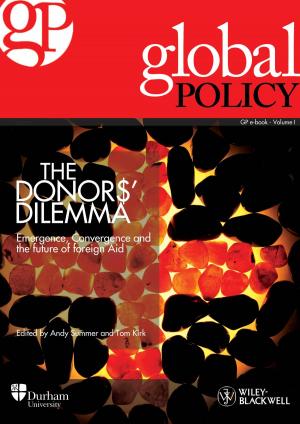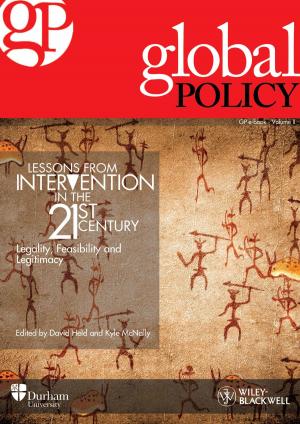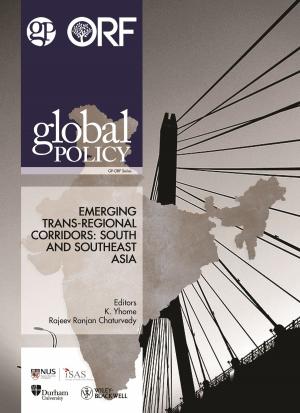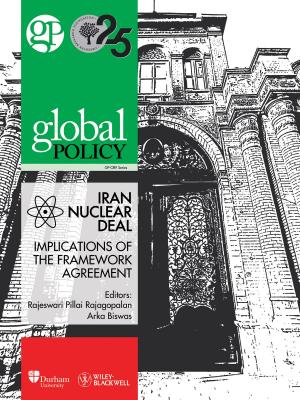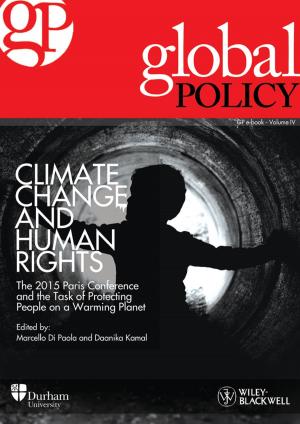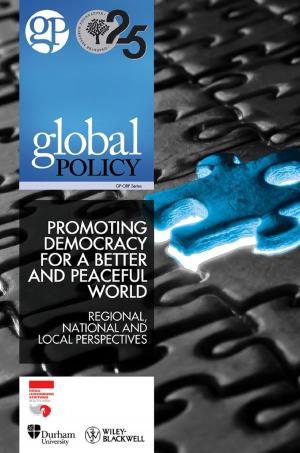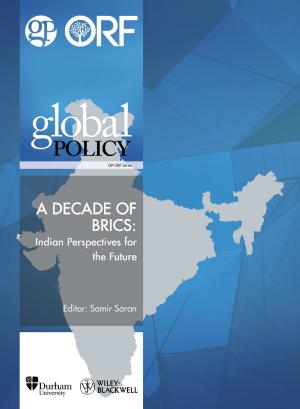The Future of the Middle East
Nonfiction, Social & Cultural Studies, Political Science, International| Author: | Global Policy | ISBN: | 9781370577125 |
| Publisher: | Global Policy | Publication: | October 23, 2017 |
| Imprint: | Smashwords Edition | Language: | English |
| Author: | Global Policy |
| ISBN: | 9781370577125 |
| Publisher: | Global Policy |
| Publication: | October 23, 2017 |
| Imprint: | Smashwords Edition |
| Language: | English |
The Middle East is in chaos and the old order is breaking down. In many countries across the region the Sunni Arabs are revolting, no longer accepting their miserable status in the world today, their lack of freedoms, rights and prosperity. All they see is a relatively if not absolutely weaker West propping up their enemies, Israel, dictators, the Kurds, even now Iran. Desperate for change, growing numbers of people have turned to Islamist movements; but their victories have been consistently subverted and denied. Predictably the result has been a slide into extremism and the rise of radical groups across the region.
What can be done? The West is faced with a choice. One option is to continue on the current path, trying to deal with the extremist phenomenon using the security defence surveillance model. This model has already demonstrably failed, with radical Islam expanding on every metric since the “War on Terror” began in 2003. Maybe it would suit tackling a guerrilla organisation in Latin America but it has done nothing to address the grievances and aspirations of millions of Arabs spanning the Middle East and North Africa, plus many more living in the West and in Asia. Continuing on this path leads to polarisation and ultimately segregation, ghettos, and unending war between Europe and the Sunni Arabs, just as bin Laden predicted.
In this e-book we ask whether to try and curb this descent into chaos the time has come for policy makers to start dealing with the moderate Islamist opposition, rather than wait till later when there is no one left but the extremists - or alternatively, whether dealing with moderate Islamist groups now risks just switching the Arab Shahs we have now to Arab Khomeinis in the future.
To consider these questions we have asked the representatives from various opposition Islamist movements - political outcasts today, but potential leaders of the Arab world tomorrow - to offer their views on where they think the Middle East is heading and what Western policy should be. We also ask our highly distinguished Western expert contributors to comment on these visions and offer their views on the future of the region in the face of the collapse of the old order.
Contents
1 Making Revolution Islamic Again: Protest and Rebellion from '79 Iran to the Arab Spring - Andrew Hammond
2 In the Shadow of the Kingdom - Saad al-Fagih
3 In Anticipation of the Next Cycle of Arab Revolutions - Azzam Tamimi
4 Translating the Informal into the Formal - George Joffé
5 The US, Saudi Arabia, and the Gulf - David B Roberts
6 Egypt, the Arab Spring and the Duping of Liberalism - Tom Dinham
7 Future Challenges Faced by Iran - Meir Javedanfar
8 The Changing Fortunes of Saudi Arabia - Nick Stadtmiller
9 Peering Ahead in the Middle East - Anthony Harris
10 Turkish Economy as a Motor of Growth in the Mediterranean Rim? - Mina Toksoz
11 The New Neocons and the Middle East - Alastair Newton
12 The Future of Yemen - Helen Lackner
13 US-Iran Relations: From Nuclear Deal to Renewed Tensions? - Christopher M. Davidson
14 Algeria: Will the Failure to Reform Economically further Fuel Islamism? - Kahina Bouagache
15 Global oil and the future of OPEC - Mehdi Varzi
16 An Impulsive Actor in the Middle East - Bitte Hammargren
17 Islam and the West: Recognition, Reconciling, Co-existence or Collision - Ashur Shamis
18 The Intersection of Wahhabism and Jihad - Mohammed Al Jarman
19 Lebanon: Losing the Peace? - Nadine Windsor
20 Political Islam Diminished - Robin Lamb
21 Prerequisites for Peace in Palestine/Israel - Alaa Tartir
22 Living Together in Tunisia - Khadija Arfaoui
23 Requiem for BICI - Bill Law
24 GCC States and Social Media Disruption in an Era of Transition - Alanoud Al-Sharekh
25 Women’s Rights in the Middle East and North Africa - Nadereh Chamlou
26 The Future of the Middle East - Hugh Miles
The Middle East is in chaos and the old order is breaking down. In many countries across the region the Sunni Arabs are revolting, no longer accepting their miserable status in the world today, their lack of freedoms, rights and prosperity. All they see is a relatively if not absolutely weaker West propping up their enemies, Israel, dictators, the Kurds, even now Iran. Desperate for change, growing numbers of people have turned to Islamist movements; but their victories have been consistently subverted and denied. Predictably the result has been a slide into extremism and the rise of radical groups across the region.
What can be done? The West is faced with a choice. One option is to continue on the current path, trying to deal with the extremist phenomenon using the security defence surveillance model. This model has already demonstrably failed, with radical Islam expanding on every metric since the “War on Terror” began in 2003. Maybe it would suit tackling a guerrilla organisation in Latin America but it has done nothing to address the grievances and aspirations of millions of Arabs spanning the Middle East and North Africa, plus many more living in the West and in Asia. Continuing on this path leads to polarisation and ultimately segregation, ghettos, and unending war between Europe and the Sunni Arabs, just as bin Laden predicted.
In this e-book we ask whether to try and curb this descent into chaos the time has come for policy makers to start dealing with the moderate Islamist opposition, rather than wait till later when there is no one left but the extremists - or alternatively, whether dealing with moderate Islamist groups now risks just switching the Arab Shahs we have now to Arab Khomeinis in the future.
To consider these questions we have asked the representatives from various opposition Islamist movements - political outcasts today, but potential leaders of the Arab world tomorrow - to offer their views on where they think the Middle East is heading and what Western policy should be. We also ask our highly distinguished Western expert contributors to comment on these visions and offer their views on the future of the region in the face of the collapse of the old order.
Contents
1 Making Revolution Islamic Again: Protest and Rebellion from '79 Iran to the Arab Spring - Andrew Hammond
2 In the Shadow of the Kingdom - Saad al-Fagih
3 In Anticipation of the Next Cycle of Arab Revolutions - Azzam Tamimi
4 Translating the Informal into the Formal - George Joffé
5 The US, Saudi Arabia, and the Gulf - David B Roberts
6 Egypt, the Arab Spring and the Duping of Liberalism - Tom Dinham
7 Future Challenges Faced by Iran - Meir Javedanfar
8 The Changing Fortunes of Saudi Arabia - Nick Stadtmiller
9 Peering Ahead in the Middle East - Anthony Harris
10 Turkish Economy as a Motor of Growth in the Mediterranean Rim? - Mina Toksoz
11 The New Neocons and the Middle East - Alastair Newton
12 The Future of Yemen - Helen Lackner
13 US-Iran Relations: From Nuclear Deal to Renewed Tensions? - Christopher M. Davidson
14 Algeria: Will the Failure to Reform Economically further Fuel Islamism? - Kahina Bouagache
15 Global oil and the future of OPEC - Mehdi Varzi
16 An Impulsive Actor in the Middle East - Bitte Hammargren
17 Islam and the West: Recognition, Reconciling, Co-existence or Collision - Ashur Shamis
18 The Intersection of Wahhabism and Jihad - Mohammed Al Jarman
19 Lebanon: Losing the Peace? - Nadine Windsor
20 Political Islam Diminished - Robin Lamb
21 Prerequisites for Peace in Palestine/Israel - Alaa Tartir
22 Living Together in Tunisia - Khadija Arfaoui
23 Requiem for BICI - Bill Law
24 GCC States and Social Media Disruption in an Era of Transition - Alanoud Al-Sharekh
25 Women’s Rights in the Middle East and North Africa - Nadereh Chamlou
26 The Future of the Middle East - Hugh Miles



